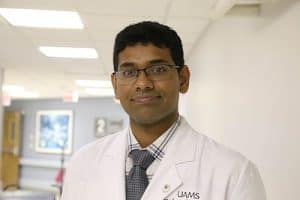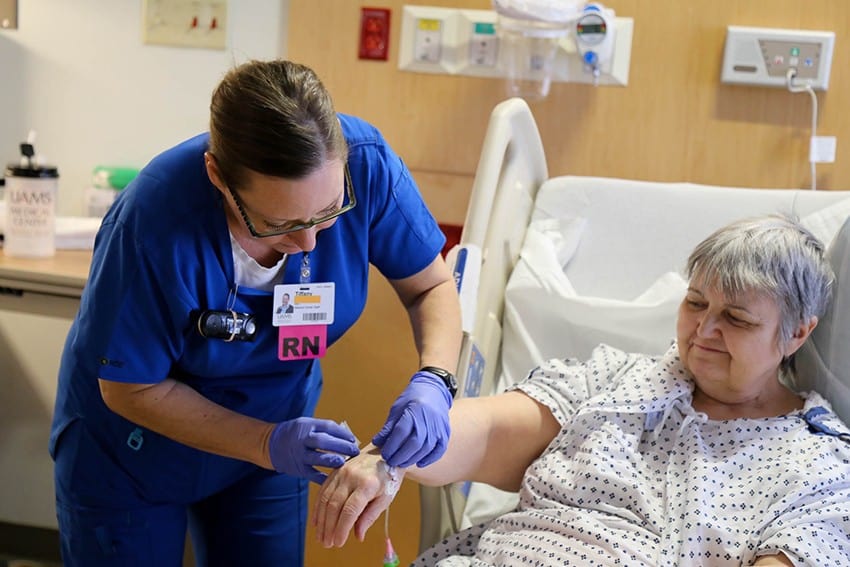Stroke Patient Feels ‘Wonderful’ After Clot Treatments
| March 2, 2016 | It began like any other Sunday for the Lemasters of Sherwood.

Mary Lemaster had a stroke while attending church Feb. 7, 2016. She was taken to UAMS on an ambulance, administered tPA and underwent surgery to remove her clot.
Mary Lemaster and her husband, James, had participated in the Sunday School class at Baring Cross Baptist Church on Feb. 7, 2016, and were getting ready to attend morning worship in the sanctuary when Mary went to the restroom.
“It hit me very quick,” she said. “I passed out when I was in the stall. Fortunately, a couple of ladies found me and called 911.”
Lemaster was unable to speak during the ordeal and did not know what had happened to her until she awoke much later at UAMS Medical Center.
“I’d had a stroke,” she said. “By the time I’d realized that, the doctor had already removed my clot and I was in recovery.”
Lemaster was administered tissue plasminogen activator, or tPA, which is a powerful clot-busting medication that acts on already-formed clots to restore blood flow to the brain. The medication should be given within three hours of the stroke to be effective. In addition to the tPA, Mehmet Akdol, M.D., a neuro interventional radiologist and assistant professor of radiology in the College of Medicine, inserted a device to remove the clot and restore blood flow to her brain.

Sanjeeva Onteddu, M.D., an assistant professor of neurology in the UAMS College of Medicine, says timing is essential when it comes to treating stroke patients.
The quick reaction by her fellow parishioners also helped save Lemaster’s life. Sanjeeva Onteddu, M.D., is an assistant professor of neurology in the College of Medicine. He treated Lemaster during her stay at UAMS.
“Many stroke patients don’t make it to hospitals within the time window for treatment for tPA,” Onteddu said. “Not only did Mary make it in time, she also received an advanced neuro-interventiontherapy that dramatically improved her chances to recovery to a point she did not have any symptoms when she left the hospital.”
Onteddu says Lemaster is very fortunate. Had she not received the treatments at the time she received them, she could have lost her ability to speak and required a tracheostomy and possibly nursing home care.
“I feel wonderful,” she said. “While I was at UAMS, I had a speech therapist, a physical therapist and an occupational therapist all work with me. I went through numerous tests. I feel so blessed to say that everything checked out normally.”

James Lemaster stayed with his wife, Mary, during her hospitalization. A former health care professional, James says he was very pleased with the quality of treatment from doctors, nurses and staff.
Lemaster will not have to have any rehabilitation after her stroke. She and her husband are very grateful for that.
“They told me that there was a chance that the treatment would not be successful,” she said. “My husband knows that I would prefer quality of life over quantity of life. That’s why he told them to go ahead with the procedure.”
“I told her that no matter what happened, I love her and always will,” James said.
Having worked in health care for many years, James says he was very impressed with the way his wife was taken care of from beginning to end.
“The whole situation was like a training exercise,” he said. “From the time the ladies found her, to the paramedics and police arriving, to the staff here at UAMS, we couldn’t have asked for better treatment. I can’t say enough good things about it.”
